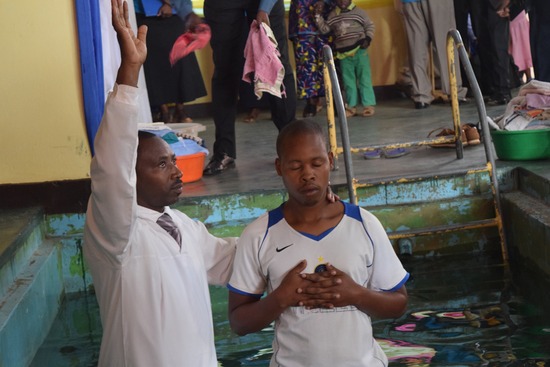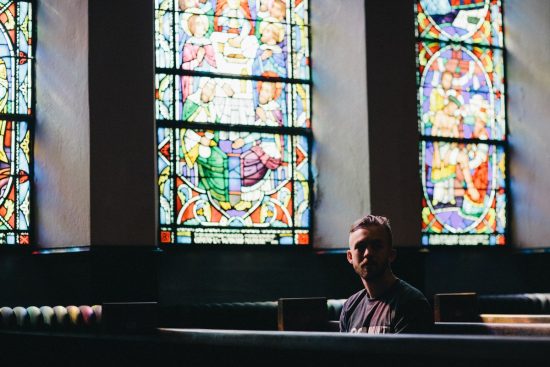Whether you heard about the Seventh-day Adventist Church through a traveling evangelist, during your online searches, or through a loved one or relative, you might be considering joining yourself.
There are a few steps involved in the process of becoming a member of the Adventist Church.
This is a process that happens as the Holy Spirit guides you. It’s best to not rush it. Let the Holy Spirit take you along at His pace for you.
You may not know much about God as you begin this journey, and that’s okay. That’s what it’s all about—learning about Him and His truth. You’ll want to pray often to talk to Him about what you are learning and thinking. And truly, we never stop learning about God and His goodness, no matter how long we have been Christian.
You may also already have a thriving relationship with God, which is wonderful! Coming to Adventism might be the result of God showing you further truth in the Bible.
But how exactly do you go about joining the church? Do you have to go somewhere or fill out a form?
In this article, we’re going to get into that. We’ll lay out the few steps you’ll want to follow, as well as why they’re important and some other common questions.
We’ll dig into:
- The steps to becoming an Adventist Christian
- How you know you’re ready
- Who is involved in the process to become an Adventist
- How long the process usually takes
Let’s start with what you want to know: the steps involved.
The steps to becoming an Adventist Christian

Photo by Nathan Dumlao on Unsplash
As we said before, the Holy Spirit will be your companion as you follow these few steps to becoming a Seventh-day Adventist. It doesn’t matter if you don’t know anything about God or have already developed a relationship with Him.
You’ll want to be careful not to treat these steps like boxes to check off just to say you did them. You want to be sure you resonate with the things you’re learning—do you believe in these things with your heart? To continue with the process, you’ll want to feel truly convicted.
Now let’s take a look at these steps!
Learn about Seventh-day Adventists
The first thing you want to do is learn about Seventh-day Adventists and their beliefs. As we already said, you never want to go into something blind. You want to spend time researching and understanding before making such a big decision.
You can learn about Adventists through other pages on this site or the church’s main website, Adventist.org. You can also read books published by Adventist publications like Pacific Press or the Review and Herald.
While you’re learning, you may also want to have a Bible on hand to study for yourself the things you read.
You can also request information from your local Adventist Church, which leads us to another step of the process.
Find your local church
When you have become familiar with Adventist beliefs, find your local church and attend Sabbath School and services one Sabbath. And this step doesn’t necessarily have to happen after the first step—attending church can help you as you learn about Adventists.
In visiting a church, you can get acquainted with the church members, who are always glad to have visitors! You can also meet the pastor or head elder.
Attending church also allows you to hear other beliefs you may not have come across in your initial reading.
Request Bible studies
The next thing you’ll want to do is request Bible studies. If you’ve attended your local church, you can ask the pastor or head elder, and they will be more than happy to study with you. You could also ask another church member or Bible worker at the church.
Why do Bible studies when you’ve already been learning about Adventism and the Bible?
This is a chance for you to do a deep dive into Adventist beliefs and how they line up with Bible teachings. You’ll go through the 28 Fundamental Beliefs and look at the core doctrines Adventists believe in. Some of these include the Second Coming, the Ten Commandments, and the state of the dead. You’ll also get a sneak peek at the history of the Adventist Church and its founders, like Ellen G. White.
Not only do you get a thorough, sequential study of the Word of God and Adventist beliefs, but you get to do it one-on-one with the pastor or another person studying with you. Here, you can ask any questions you may have. No questions are too silly! The person you are studying with wants you to ask questions because it means you’re thinking and want to know more.
When you finish your Bible studies, there aren’t any tests to “pass” them. They are designed to help you study God’s Word and build your relationship with Jesus Christ, not to pass a test. It is up to you to learn all you can.
Make the commitment

Once you feel you have a good, solid understanding of Adventist beliefs within the Bible, it’s time to officially commit yourself to your new beliefs. This is done through baptism.
Baptism is a public profession of faith—telling everyone openly that you have adopted belief in Jesus through the Adventist understanding of His Word. Baptism is a celebration—a wonderful time in your life.
In the Adventist Church, you’re baptized by immersion. This means you’re dipped totally underwater—the way the Bible instructs us to be.
On the technical side, baptism automatically makes you a member of the Seventh-day Adventist Church. This gives you a say in church matters and allows you to hold positions in the church, like deacon or treasurer.
If you have already been baptized by immersion into another Protestant denomination, you can also choose to make a profession of faith instead of being rebaptized.
A profession of faith is the same idea as baptism: it’s a formal declaration that you believe in Jesus and want to be part of the Adventist Church. You just aren’t immersed in water, like baptism.
Either at the same time or within the next weeks after your baptism or profession of faith, your church will likely have a reading, or public vote, on whether to accept you as a member. Don’t worry about this step: most people are eagerly voted in!
Why these steps are important
Following these steps is important because they help you understand more about the church you’re joining and the community of believers you’ll be a part of.
You’ll get to meet the head of the community—the pastor—and see how the church functions.
You’ll get to see how Adventists put their beliefs into practice daily. Not to mention you’ll get to learn what everything means and figure out the context behind everything you’ve heard or read.
All of these things will help you thrive in your new-found church community. This is why going through these steps is so fundamental.
But do you have to become a member to be a part of the church?
No, it’s not mandatory. But practically speaking, it’s a good idea if you want to be a part of the church to go ahead and become a member.
Logistically, membership helps keeps things organized in the structure of the church and the General Conference, the worldwide representative body of the church. We live in a world of databases and systems, so having a membership makes it easier in church structure.
But most of all, there is something special about membership. It makes a person feel especially connected to a community and prioritize their commitment there. When you become an official member, you are more likely to be involved, and because of your involvement, you’ll likely feel more like a part of that church family.
How you know you’re ready
As we’ve said earlier, there is no magic formula to determine when you’re ready. You don’t have to be a certain age or a certain economic status. People of all ages, from children to high school age to older people join the church, and people of all walks of life and economic status are welcome.
The Holy Spirit works on our hearts in its own time, little bit by little bit, guiding us to the truth as we are ready to receive it.
But it’s important to be sure of a few things before you make the commitment. You’ll want to accept the Lord Jesus as your Savior, and thoroughly understand our fundamental beliefs as the Bible teaches them, as we outlined in the steps above.
And, most importantly, you will want to feel really convicted of these things. You don’t want to become a member just because your spouse or friend did. You must personally want to believe in your heart the Biblical truths shown to you.
Who is involved in the process to become an Adventist
Normally, this will be the pastor, elder, or Bible worker in your area or local church. They will study the Bible with you and answer any questions you have along the way.
But other support can be great too! Any big decision can be a little stressful. If you have any relatives or friends who are Adventists, go to them for emotional support.
Also, new friends you’ve made at your Adventist Church will gladly give you support and help answer your questions. They will help you feel at home as you go through this big transition.
How long the process usually takes
There is no set time for when to complete the process of becoming an Adventist. It isn’t something that happens at the snap of your fingers. It takes time to learn and study everything.
When we’re learning what Scripture says, we are learning about God (John 1:1). Since God has existed forever, even a lifetime of Bible study is not enough to learn everything about Him. An introductory Bible study, like what you’ll take with a pastor, elder, or other trusted church members, will take time.
For everyone, it’s different. Some complete this process in a few weeks. For others, it takes several months or a year. For others, it might take longer. It depends on your pace.
If you’re chomping at the bit, wondering why certain aspects might be taking too long, keep in mind that God knows what’s best for us. In the New Testament, Jesus tells His Disciples that He knows even when a sparrow falls, and a human is so much more important than a sparrow (Matthew 10:29-31).
Let God work at His own pace, and He will do wonderful things in your life.
The important thing is to focus on what you’re learning, not how long it’s taking.
Becoming a Seventh-day Adventist can’t be a decision of a moment. It’s something that can come only after meditative study of the Bible and inner acceptance of the beliefs presented.
It’s about the state of your heart.
The process we discussed helps you get a well-rounded introduction to the new life you’ll find in Adventism through belief in Jesus.
If you want to learn more about the public commitment to Adventism and what it signifies,
Related Articles
More Answers
What Seventh-day Adventists Believe about the Bible
The Bible forms the foundation for all that Seventh-day Adventists believe and teach. It reveals God to us and is our final authority on all issues relating to morals, doctrine, salvation, and the very nature and purpose of life itself (Isaiah 8:20).
What Does the Bible Say About the End Times?
First of all, when we say “end times,” this refers to the period of time that precedes the second coming of Jesus—and the end of this sinful world before it’s recreated into the new earth. And several passages of Scripture provide us with clues and guidelines to help us recognize when these times are near, what kinds of things we can expect, and what it might mean for our daily lives and priorities.
Online Bible Studies
Choose an Online Bible Study Want to keep learning? There’s always more to discover within the pages of the Bible. Find out more about Jesus, humanity, the plan of salvation, and how God loves you enough to sacrifice everything, just to give you a chance to choose...
Why Do Some Bibles Have More Books Than Others?
Christians consider the Bible as their sacred writings. But within Christianity, different denominations use Bibles with different numbers of books.
How Did Ellen G. White Help Found the Adventist Church?
Ellen G. White, a humble woman from Gorham, Maine, was a co-founder of the Seventh-day Adventist Church and a key leader in it from its very beginning. Following the Holy Spirit’s guidance at a young age, she dedicated herself to studying Scripture and became involved in the Advent Movement.
Ellen G. White’s Time in Europe
When the Seventh-day Adventist Church was still young, a council of the church in Europe requested Ellen White, one of Adventism’s key leaders, to come to Europe. Despite the many obstacles, God led her there to help the new churches and members for two years.
Ellen G. White’s Time in Australia
Ellen White traveled to Australia in the later part of her life, and she ended up spending nine years there. In that time, she helped the Australian Seventh-day Adventist Church increase in size and strength.
Can I Be an Adventist If I Don’t Believe in Ellen White?
Ellen White is an important part of the Seventh-day Adventist Church: she played a significant role in its founding, provided biblical support for several key doctrines, and continues to inspire church members today with her insightful counsel.
Who Was James Springer White?
James Springer White (1821–1881) was a key figure in the Seventh-day Adventist Church and the husband of Ellen G. White.
What Do Seventh-day Adventists Believe about The Second Coming of Christ?
The second coming of Jesus Christ is an event the Bible prophesies will occur at the end of this world’s history. It’s called His second coming to distinguish it from His first, when Jesus was born to Mary and lived as a human before dying on the Cross.
What Are Seventh-Day Adventist Sermons Like?
In nearly every Seventh-day Adventist Church, the sermon is the focal point of the main service—similar to many Protestant Christian denominations. It is a time of biblical instruction by the pastor, who shares what they’ve been studying in the Bible and preparing over the previous week.
What Do Seventh-day Adventists Believe about God the Son?
Seventh-day Adventists believe that Jesus is fully God as one of the members of the Trinity together with God the Father and the Holy Spirit. He plays a central role in it.
What do Seventh-day Adventists Believe about Creation?
Seventh-day Adventists believe that God is the creator of our world. They come to this conclusion from the first book of the Bible—Genesis. The account there tells us that God took six literal days to form the earth and all it contains, including us humans.
What do Seventh-day Adventists Believe about Sin and the Nature of Humanity
Seventh-day Adventists believe that humanity was created perfect and that, at our very core, we crave this kind of perfection and unity with God. But unfortunately, the Bible teaches that we chose to be wise in our own eyes and disobey God, which led to a natural tendency to be sinful, evil, and selfish.
Prayer Request
Send Us Your Prayer Requests May We Pray for You? Prayer is powerful. When we pray, we communicate with God, support one another, attune ourselves to God’s presence in our lives, and open our hearts to be moved by the Holy Spirit. The Bible tells us to “be anxious for...
Donate
Help us keep the answers coming!Hope for Africa AAAF is a not-for-profit outreach project that is committed to answering your questions about Seventh-day Adventism, Jesus, the Bible, the Great Controversy, and more.Thank you for your interest and...
Contact Us
Contact UsSend Us a MessageWe’d love to hear from you!Feel free to ask a question, request information, or offer a suggestion. Help us keep the answers coming!Hope for Africa AAAF is not a business, but a project based on a mission to provide accurate, helpful...
Didn’t find your answer? Ask us!
We understand your concern of having questions but not knowing who to ask—we’ve felt it ourselves. When you’re ready to learn more about Adventists, send us a question! We know a thing or two about Adventists.

















